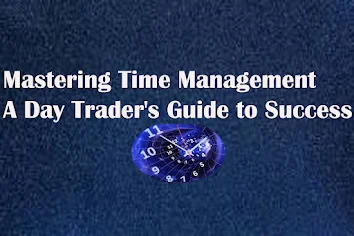Guidance and Membership: The Path to Easy Success for Day
Traders
Introduction:
Day trading can be an exhilarating and potentially lucrative
endeavor, but it also comes with its share of challenges and risks. As a novice
day trader, finding success on your own can be daunting. However, there's a
proven way to increase your chances of success: seeking guidance and becoming
part of a day trading community or membership. In this blog post, we explore
the benefits of guidance and membership for day traders and how they can pave
the way for easier success in the dynamic world of day trading.
Access to Expertise and Knowledge:
One of the most significant advantages of joining a day
trading membership or community is gaining access to a wealth of expertise and
knowledge. Seasoned traders often share their insights, strategies, and
experiences, helping beginners avoid common pitfalls and make better-informed
decisions.
Learning from Real-Life Examples:
Guidance and membership offer the opportunity to learn from
real-life trading examples. Many communities provide live trading rooms where
members can observe and follow trades executed by experienced traders in
real-time. This hands-on learning experience can be invaluable for grasping
practical day trading techniques.
Continuous Learning and Education:
The financial markets are ever-evolving, and successful day
traders adapt to changing conditions. Membership often includes access to
regular webinars, workshops, and educational resources, enabling traders to
stay up-to-date with the latest market trends and refine their strategies.
Building a Supportive Network:
Day trading can be a solitary pursuit, but being part of a
trading community provides a supportive network of like-minded individuals.
Traders can share ideas, seek advice, and motivate each other, creating a sense
of camaraderie and resilience.
Risk Management and Accountability:
Membership often emphasizes the importance of risk management
and adhering to trading plans. Traders are encouraged to set strict risk
parameters and be accountable for their actions, reducing the likelihood of
impulsive decisions driven by emotions.
Access to Cutting-Edge Tools and Technology:
Many day trading communities offer access to advanced trading
tools and technology that can streamline analysis and execution. These tools
can save time and provide a competitive edge in fast-paced markets.
Mentorship Opportunities:
Some day trading memberships may provide mentorship
opportunities where experienced traders offer personalized guidance to newer
members. Mentorship can accelerate learning and provide tailored advice based
on individual strengths and weaknesses.
Feedback and Performance Evaluation:
Guidance and membership often include opportunities for
receiving feedback on trades and performance evaluation. Constructive criticism
can help traders identify areas for improvement and refine their strategies.
Confidence Building:
Joining a supportive day trading community can boost a
trader's confidence, especially during challenging times. Knowing that you're
not alone in the journey can provide reassurance and encouragement.
Community-Driven Insights:
In a trading community, members often share their analysis
and insights on market movements. These diverse perspectives can enhance
traders' understanding of the markets and lead to more informed decisions.
Conclusion:
While day trading success is never guaranteed, seeking
guidance and becoming part of a day trading membership can significantly
increase your chances of achieving your goals. The access to expertise,
continuous learning opportunities, supportive network, and accountability
provided by memberships all contribute to a more structured and informed
approach to day trading. Remember, success in day trading requires dedication,
discipline, and continuous improvement, and being part of a thriving trading
community can make this journey easier and more rewarding.









